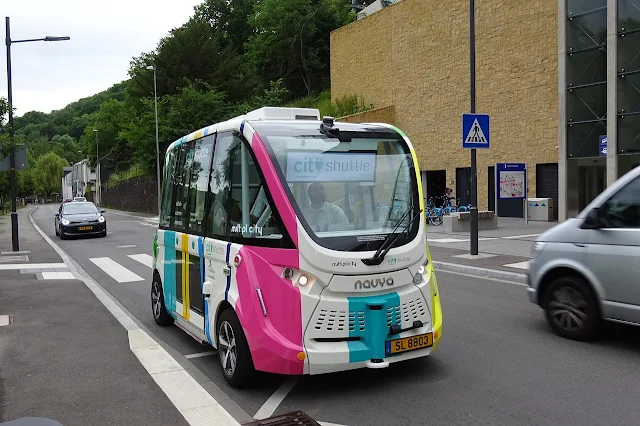The Impact of Autonomous Vehicles on Transportation
Autonomous vehicles, also known as self-driving cars, have
the potential to revolutionize transportation in the coming years. With the
development of advanced technology and the potential for increased safety and
efficiency, autonomous vehicles are poised to transform the way we travel. In
this article, we'll explore the impact of autonomous vehicles on
transportation.
Benefits
1. Increased Safety
Autonomous vehicles have the potential to significantly reduce
the number of accidents and fatalities on the road. With advanced sensors and
computer systems, self-driving cars can respond more quickly and accurately to
potential hazards and avoid accidents.
2. Improved Efficiency
Autonomous vehicles could also improve the efficiency of
transportation systems by reducing congestion and travel time. With the ability
to communicate with other vehicles and the transportation infrastructure,
self-driving cars could optimize routes and reduce traffic, leading to faster
and more efficient travel.
3. Increased Accessibility
Autonomous vehicles could also increase accessibility for
individuals who are unable to drive due to disabilities or other limitations.
With self-driving cars, these individuals could have greater independence and
mobility.
4. Reduced Environmental Impact
Autonomous vehicles could also have a positive impact on
the environment by reducing emissions and improving fuel efficiency. With
optimized routes and fewer accidents, self-driving cars could reduce traffic
and congestion, leading to a reduction in greenhouse gas emissions.
Risks
1. Technical Limitations
One of the biggest risks of autonomous vehicles is the
potential for technical limitations and malfunctions. As with any technology,
self-driving cars are not perfect, and there is always the potential for
technical failures that could lead to accidents.
2. Cybersecurity Risks
Autonomous vehicles also pose cybersecurity risks, as they
rely on computer systems and networks that are vulnerable to hacking and
cyberattacks. A security breach could potentially compromise the safety and
privacy of passengers and other individuals on the road.
3. Liability Issues
Another risk of autonomous vehicles is the potential for
liability issues in the event of an accident. It is not yet clear how liability
will be determined in the case of accidents involving self-driving cars, and
there is potential for legal and ethical issues to arise.
4. Impact on Jobs
The widespread adoption of autonomous vehicles could also
have a significant impact on jobs in the transportation industry, particularly
for drivers of taxis, buses, and other vehicles.
Conclusion
Autonomous vehicles have the potential to revolutionize
transportation by improving safety, efficiency, accessibility, and reducing
environmental impact. However, there are also significant risks, including
technical limitations, cybersecurity concerns, liability issues, and potential
job losses. It's important for policymakers, industry leaders, and individuals
to carefully consider the potential benefits and risks of autonomous vehicles
and work together to ensure the safe and responsible adoption of this
technology.
By understanding the impact of autonomous vehicles on
transportation, we can make informed decisions about how to move forward with
this transformative technology. With careful planning and implementation, we
can harness the power of self-driving cars to create a safer, more efficient,
and more accessible transportation system for all.
FAQ
Q1. When will autonomous vehicles be widely available?
A1. The timeline for the widespread availability of autonomous vehicles is
uncertain and depends on a variety of factors, including technological
advancements, regulatory approval, and public acceptance.
Q2. What level of autonomy do self-driving cars currently have?
A2. Self-driving cars currently range from Level 1 (driver assistance) to
Level 5 (fully autonomous), with most cars on the road today at Level 1 or 2.
Q3. What industries will be impacted by autonomous vehicles?
A3. Autonomous vehicles are expected to impact a wide range of industries,
including transportation, logistics, insurance, and more.
Q4. How will autonomous vehicles impact the environment?
A4. Autonomous vehicles have the potential to reduce emissions and improve
fuel efficiency, leading to a positive impact on the environment.
Q5. What are some potential benefits of autonomous delivery vehicles?
A5. Autonomous delivery vehicles could improve the efficiency and speed of
deliveries, reduce transportation costs, and reduce the risk of accidents
involving delivery vehicles.
References
1. National
Highway Traffic Safety Administration. (2021). Automated Vehicles for Safety. https://www.nhtsa.gov/technology-innovation/automated-vehicles-safety
2. McKinsey
& Company. (2019, March). The Road Ahead for Autonomous Vehicles. https://www.mckinsey.com/industries/automotive-and-assembly/our-insights/the-road-ahead-for-autonomous-vehicles
3. Green
Car Congress. (2021). Study Finds Autonomous Delivery Vehicles Could Reduce
Logistics Costs by 40%, CO2 Emissions by 50%. https://www.greencarcongress.com/2021/02/20210218-walmart.html
Closing Thoughts
Autonomous vehicles have the potential to transform transportation, offering
increased safety, efficiency, and accessibility, while reducing environmental
impact. However, there are also significant risks and challenges to be
addressed, including technical limitations, cybersecurity concerns, liability
issues, and potential job losses.
As autonomous vehicles continue to develop and become more widespread, it's
important for policymakers, industry leaders, and individuals to work together
to ensure the safe and responsible adoption of this technology. By carefully
considering the potential benefits and risks of autonomous vehicles and working
to mitigate these risks, we can harness the power of self-driving cars to
create a better, more efficient, and more sustainable transportation system for
all.
Also Read : Cryptocurrency: Is it the Future of Money?

Post a Comment for "The Impact of Autonomous Vehicles on Transportation"